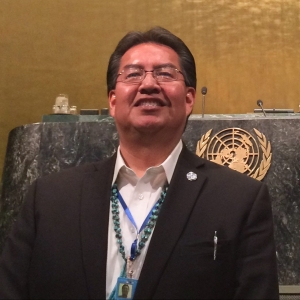 Terry Sloan, a member of the New Mexico Interfaith Power & Light board of directors, wrote a piece for the National Catholic Reporter relating how a new presidential administration would help improve the situation for Native/Indigenous communities in the U.S. Mr. Sloan is a Navajo and Hopi Native American from Tuba City, AZ. He has extensive experience with Tribal governments and non-profit organizations, governments, economic development and is the current supervising/manager senior accountant with Sloan & Company. Below are excerpts of the NCR article published on Jan. 26. 2021.
Terry Sloan, a member of the New Mexico Interfaith Power & Light board of directors, wrote a piece for the National Catholic Reporter relating how a new presidential administration would help improve the situation for Native/Indigenous communities in the U.S. Mr. Sloan is a Navajo and Hopi Native American from Tuba City, AZ. He has extensive experience with Tribal governments and non-profit organizations, governments, economic development and is the current supervising/manager senior accountant with Sloan & Company. Below are excerpts of the NCR article published on Jan. 26. 2021.
I am a Native/Indigenous American in a torn United States. It was painful to watch the dismantling of our once great country the last four years. I — we — could do nothing to stop it but attempted to minimize the damage and destruction where we could, as we were powerless, even amongst the powerful.
It was a hard-fought battle for me and my efforts to get Joe Biden elected 46th president of the United States. I am that rarity, a Catholic Native American…I can now breathe, relax and have faith again in our government.
I was ecstatic to see Biden sign the United States back on to the Paris Agreement on climate change. The Paris Agreement is an accord within the United Nations Framework Convention on Climate Change, addressing the mitigation of greenhouse gas emissions, along with adaptation and finance.
Native Americans are affected by climate change differently, depending on their location. In the arid Southwestern U.S., we continue to be faced with drought, which affects our water supply, our food supply, our agriculture and even our access to livestock and animals for hunting. We need running rivers; we need our lakes and aquifers restored. Climate change is affecting these things by changing weather patterns, which in turn change the migration of animals and fish on which northern tribes depend to provide food for their families.
From a Native American rights perspective, I ask that our rights be once again honored and respected. Many of our rights have been trampled on, disrespected and violated, our lands exploited, our needs and wishes ignored and or shelved.
The implementation of the United Nations Declaration on the Rights of Indigenous Peoples (UNDRIP) must restart. In September 2014, at the U.N. World Conference on Indigenous Peoples, the General Assembly mandated that all member states begin implementation of the declaration.
Read full article in NCR


